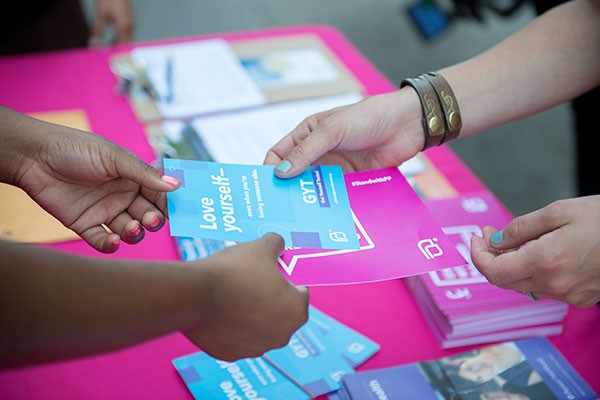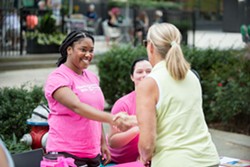About 300 people, including local leaders like Mayor Jennifer Roberts, showed up at Foundation for the Carolinas last week to celebrate the birthday of one of America's most important and controversial organizations.
The 100-year anniversary of the founding of Planned Parenthood officially fell on Sunday, October 16, so the party was a few days early. Attendees watched Theresa Nardi accept the Sarah Bryant Award and author Anna Quindlen give a keynote address.
As Charlotte's office moves into what they hope to be another century of providing healthcare services to folks across the socioeconomic spectrum, there's a new community that can now look to Planned Parenthood for access to healthcare that can often be hard to find: the trans community.
On August 1, Planned Parenthood's Charlotte office officially began offering services to transgender people, including on-site hormone replacement therapy and referral services for other healthcare needs. The summer's training that led up to the official implementation of transgender healthcare services at Planned Parenthood included clinical training for physicians and cultural diversity training for all staff at the Charlotte office. The training was funded by a grant from the Foundation for the Carolinas' Lesbian & Gay Fund.
Transgender healthcare services are already offered in Planned Parenthood's Asheville and Raleigh offices, but this is a first for Charlotte.
"Looking back, as we are celebrating our centennial, we just made such huge gains in our first century; birth control was once out of reach and is now highly available, abortion was once a crime and is now legal, Planned Parenthood itself, which was a single location in Brooklyn, we now have 650 healthcare centers across the country," says Sarah Eldred, spokesperson for Planned Parenthood South Atlantic, which includes the Charlotte office. "Transgender healthcare just fits into our narrative of being progressive, being groundbreaking and having this revolutionary idea that all people should have the information and care that they need to live strong, healthy lives and fulfill their dreams. This is part of that care, to be able to live your most authentic self."
The new services come at a time when Charlotte's trans community has been targeted by right-wing legislators in the General Assembly, as seen in House Bill 2, passed during a special session in March in response to the Roberts-led Charlotte City Council passing a non-discrimination ordinance to protect transgender people.
The Charlotte Planned Parenthood office applied for the grant that would eventually fund the training necessary to offer healthcare services to trans people before HB2 was passed, Eldred says. However, the organization is happy to support a community under attack by Republican politicians, as that's a position its staff has been used to for some time now.
"It is true that we had started preparing for and applying for this grant before HB2 passed, but it is perfect timing and I think that we are going to continue to fight for expansion of healthcare and all of the other things that we're doing because we know that the legislature as it stands right now is going to keep doing this," Eldred says. "It just speaks to how we're going to keep fighting and keep providing healthcare no matter what the legislature throws at us, which unfortunately, as we've seen in recent years, is quite a bit."

For Paige Dula, founder of GenderLines, a transgender support group that meets twice a month in Charlotte, the news couldn't have come soon enough.
"It's a huge boon to the trans community here in Charlotte. It fills a huge void," Dula says. "So many of the physicians that support the trans community here don't take Medicaid, or they don't have sliding scale [payment options]. For people who are in tough financial situations, they don't have a whole lot of options. Given that they're doing this, we couldn't ask for anything better."
Although this was good news to Dula, it was also important to note that it was news to her. In the two months its been offered, Dula hadn't heard about the new services.
"I'm fairly plugged in to what's going on in the transgender community and in the medical community here in Charlotte, so that's a huge surprise to me," she says. "But a welcome surprise, for sure. We need to try to get the word out."
While Planned Parenthood's history in America began with a single clinic run by founder Margaret Sanger in Brooklyn's Brownsville neighborhood — which would be raided by police nine days into its existence — its arrival in Charlotte came some time later.
Sarah Bryant founded Planned Parenthood Health Systems of Charlotte in 1969. PPHS would later merge into Planned Parenthood South Atlantic. About 3,000 people visit the Charlotte office for healthcare appointments each year, with countless others who receive birth control or antibiotics through Planned Parenthood.
For Marcie Shealy, director of philanthropy at Planned Parenthood in Charlotte, the organization was a great fit. She had been out of work for four years after quitting her job in 2008 to volunteer in President Obama's first campaign. Then, in 2012, after working to get him re-elected, the opportunity at Planned Parenthood Charlotte presented itself.
"I wasn't even looking," Shealy says. "But it seemed like something I could do to have an impact in our community for the next generation."
Shealy's job, a large part of which is raising funds with events like Thursday's birthday party, is all the more important in a city where Planned Parenthood does not receive any federal or state funding.

- Planned Parenthood staff speaking with a resident at a recent event.
Another part of her job also involves cultivating relationships with partners throughout the community in order to connect them with the multiple free education programs that Planned Parenthood offers.
One example of these programs is full-time Planned Parenthood educator Anna Williams' peer-to-peer mentoring program, during which Williams trains high school students in a range of topics from risky behavior like sex and alcohol to self-esteem and bullying. While learning about these things, the students are also trained to be mentors themselves, so they can have an impact on their peers.
It's one example of the types of services offered by Planned Parenthood that Shealy says get overlooked in all the political debate that surrounds the organization.
"People think Planned Parenthood is about abortion. Three percent of the services we do nationwide involve abortion. In Charlotte we don't even provide abortion, because we don't have the facilities," she says. "A lot of people I talk to are surprised when they hear that. It's not that we wouldn't like to, we just don't have the facilities. I don't think people understand the education aspect, in that providing education for reproductive health, and providing birth control, we're reducing unwanted pregnancies and therefore, reducing abortions. The people that are against abortion, well what do you do? You have to educate people. That's a big portion of what we do."
Shealy said she doesn't get much pushback from friends or family about working for an organization that takes so much heat from Christian conservatives. Most people who know her, she says, know it's something she believes in greatly.
"I'm not concerned at all. I feel, as most of us feel, that every woman deserves to make her own decision about her body. It's between me and my doctors, not between me and my politician and my neighbor," Shealy says. "I have no problem working here. Have I had pushback? Sometimes I run into people like that and my question to them is, 'Why do you feel that way?' I don't think people understand what Planned Parenthood does. They only hear what they hear on the radio or news."
Now, as the organizations looks ahead to the next 100 years, they've begun introducing new services that early figures like Sanger and Blake could have only dreamed of. The organization offers educative programs online for all ages, and this summer saw the release of SpotOn, a new app created by Planned Parenthood that helps women track their periods and birth control regiment.
"We are right there in the digital age," Shealy says.
More important than keeping up with technology, however, is Planned parenthood's commitment to staying progressive, and that's what finally being able to fund transgender healthcare services in Charlotte is all about.
"It's a natural fit for Planned Parenthood. We care without judgment. It's a natural fit for our patient base and the people that work here," Shealy says. "I think that's something that's important to all of us, that we lift up all people, no matter their background, no matter their gender, no matter their issues, we do not judge a patient when they come in with any issues. What can we do to help you? Whether it's a wellness visit, reproductive issues, trans issues, STIs. So it is a natural fit for Planned Parenthood, because we all feel very strongly that everyone should be served."